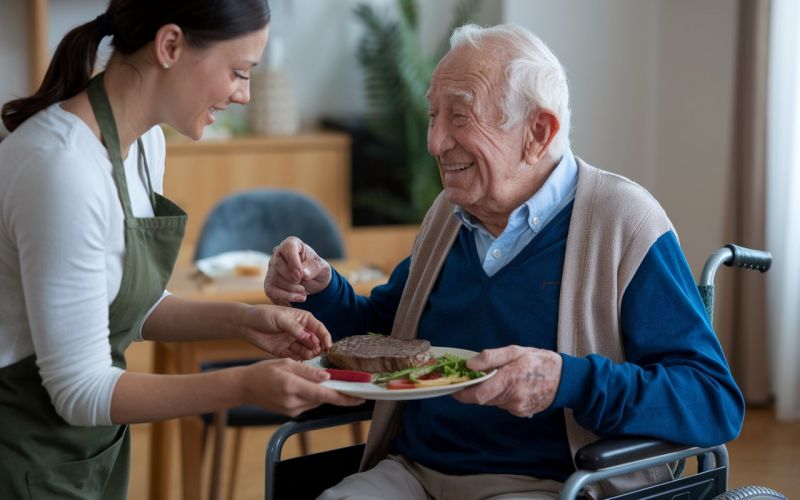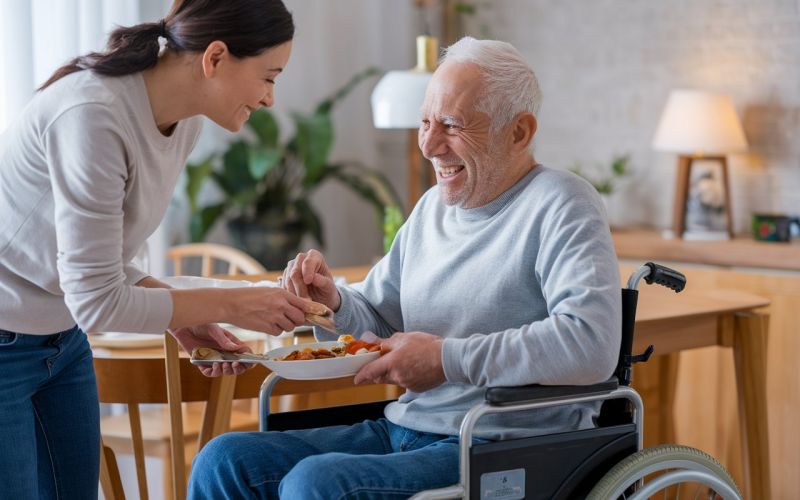Managing Nutrition and Hydration for Elderly Patients: A Caregiver’s Guide
iSavta | 23.02.2025

Proper nutrition and hydration are essential for maintaining the health and well-being of elderly patients. As people age, their dietary needs, appetite, and ability to stay hydrated may change due to various factors such as medical conditions, medications, or a decrease in physical activity. Caregivers play a crucial role in ensuring elderly individuals receive the necessary nutrients and fluids to support their overall health. Here are some essential guidelines to help caregivers manage nutrition and hydration for elderly patients effectively.
1. Understand Nutritional Needs
Elderly individuals often require a diet rich in essential nutrients to maintain strength and prevent illnesses. A balanced diet should include:
-
Protein: Helps maintain muscle mass and strength. Good sources include lean meats, eggs, dairy, beans, and fish.
-
Fruits and Vegetables: Provide vitamins, minerals, and fiber essential for digestion and overall health.
-
Whole Grains: Supply energy and fiber, aiding in digestion and preventing constipation.
-
Healthy Fats: Support brain function and overall health. Sources include nuts, avocados, and olive oil.
-
Calcium and Vitamin D: Essential for bone health. Found in dairy products, leafy greens, and fortified foods.
2. Address Common Eating Challenges
Elderly individuals may face difficulties that affect their eating habits, including:
-
Loss of Appetite: Encourage small, frequent meals and offer favorite or flavorful foods.
-
Chewing and Swallowing Problems: Provide softer foods or pureed meals to ease eating.
-
Digestive Issues: Offer high-fiber foods and ensure adequate hydration to prevent constipation.
-
Medication Side Effects: Some medications can affect appetite or taste. Consult a doctor if necessary.
3. Promote Hydration
Dehydration is a common issue among elderly individuals, leading to health problems such as confusion, dizziness, and urinary tract infections. To ensure proper hydration:
-
Offer water regularly throughout the day, even if they don’t feel thirsty.
-
Provide hydrating foods like soups, fruits (watermelon, oranges), and vegetables.
-
Avoid excessive caffeine and alcohol, which can contribute to dehydration.
-
Use reminders, such as setting alarms or using marked water bottles, to track fluid intake.
4. Create an Enjoyable Eating Environment
-
Serve meals in a comfortable, well-lit space.
-
Encourage social meals with family or friends to make eating more enjoyable.
-
Use adaptive utensils or special plates if needed to assist with eating.
5. Monitor Weight and Health Changes
-
Regularly check for weight loss or signs of malnutrition.
-
Keep track of food and water intake.
-
Consult a healthcare professional if there are concerns about diet or hydration levels.
Conclusion
Proper nutrition and hydration are vital for elderly patients to maintain their health, energy levels, and overall quality of life. Caregivers can support their loved ones by understanding their dietary needs, encouraging healthy eating habits, and ensuring consistent fluid intake. Small but thoughtful changes in their daily routine can make a significant difference in their well-being.












